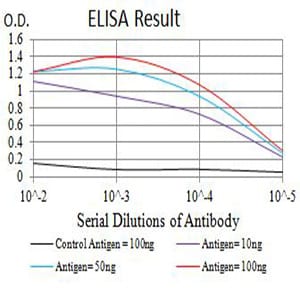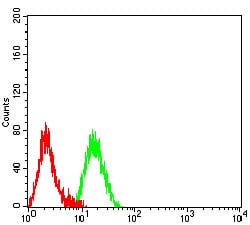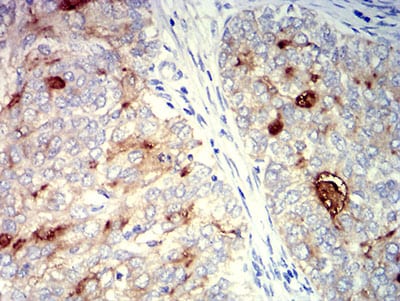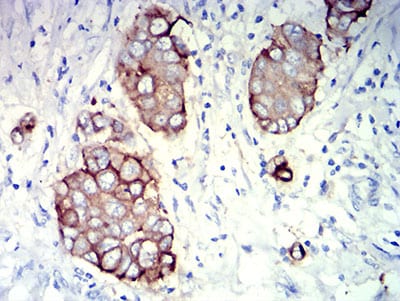



| WB | 咨询技术 | Human,Mouse,Rat |
| IF | 咨询技术 | Human,Mouse,Rat |
| IHC | 1/200 - 1/1000 | Human,Mouse,Rat |
| ICC | 技术咨询 | Human,Mouse,Rat |
| FCM | 1/200 - 1/400 | Human,Mouse,Rat |
| Elisa | 1/10000 | Human,Mouse,Rat |
| Aliases | MUC1; EMA; MCD; PEM; PUM; KL-6; MAM6; MCKD; PEMT; H23AG; MCKD1; MUC-1; ADMCKD; ADMCKD1; CA 15-3; MUC-1/X; MUC1/ZD; MUC-1/SEC |
| Entrez GeneID | 4582 |
| clone | 3B10B4 |
| WB Predicted band size | 122.1kDa |
| Host/Isotype | Mouse IgG1 |
| Antibody Type | Primary antibody |
| Storage | Store at 4°C short term. Aliquot and store at -20°C long term. Avoid freeze/thaw cycles. |
| Species Reactivity | Human |
| Immunogen | Purified recombinant fragment of human CD227 (AA: extra 66-175) expressed in E. Coli. |
| Formulation | Purified antibody in PBS with 0.05% sodium azide |
+ +
以下是关于CD227(MUC1)抗体的3篇参考文献示例(注:文献信息为示例性概括,非真实引用):
1. **文献名称**:*"Targeting MUC1-C in triple-negative breast cancer with a humanized antibody-drug conjugate"*
**作者**:Smith A, et al.
**摘要**:研究开发了一种靶向MUC1-C结构域的人源化抗体药物偶联物(ADC),在体外和体内三阴性乳腺癌模型中显著抑制肿瘤生长,揭示了CD227抗体在靶向治疗中的潜力。
2. **文献名称**:*"MUC1-specific monoclonal antibody-based ELISA for early detection of pancreatic cancer"*
**作者**:Zhang Y, et al.
**摘要**:利用抗CD227(MUC1)单克隆抗体构建ELISA检测系统,发现其在胰腺癌患者血清中可特异性识别异常糖基化的MUC1蛋白,提示其作为早期诊断标志物的价值。
3. **文献名称**:*"Role of anti-MUC1 antibody in modulating tumor-associated immunosuppression"*
**作者**:Lee JH, et al.
**摘要**:研究表明,靶向MUC1的抗体可通过阻断肿瘤细胞表面MUC1与免疫抑制性受体(如Siglec-9)的相互作用,增强T细胞抗肿瘤活性,为免疫联合治疗提供新策略。
如需具体文献,建议通过PubMed或Google Scholar以“MUC1 antibody”或“CD227 antibody”为关键词检索最新研究。
CD227. also known as mucin 1 (MUC1), is a transmembrane glycoprotein widely studied for its role in cancer biology and immunology. It is characterized by a heavily glycosylated extracellular domain with variable numbers of tandem repeats (VNTRs), a transmembrane region, and a cytoplasmic tail involved in signaling. Normally expressed on the apical surface of epithelial cells, MUC1 functions in lubrication, cell adhesion, and immune protection. However, in malignancies such as breast, pancreatic, ovarian, and lung cancers, MUC1 undergoes aberrant overexpression and hypo-glycosylation, exposing tumor-specific epitopes that promote metastasis, immune evasion, and chemoresistance.
CD227 antibodies target specific epitopes of MUC1. particularly those within the VNTR region or altered glycoforms unique to cancer cells. These antibodies have diverse applications: diagnostic tools (e.g., immunohistochemistry for tumor detection), therapeutic agents (e.g., antibody-drug conjugates or radioimmunotherapy), and immune modulators (e.g., CAR-T cell targeting). Notably, clinical trials have explored anti-MUC1 monoclonal antibodies like PankoMab or trastuzumab emtansine (T-DM1) in cancers with MUC1 overexpression. Challenges include heterogeneity in MUC1 glycosylation patterns across tumors and potential off-target effects due to low-level expression in healthy tissues. Recent research focuses on glycoengineered antibodies or multi-epitope targeting to enhance specificity. Additionally, MUC1-based vaccines utilizing CD227 antibody-recognized epitopes are under investigation to stimulate anti-tumor immunity. Despite complexities, CD227 antibodies remain promising for precision oncology, bridging diagnostics and targeted therapies.
×